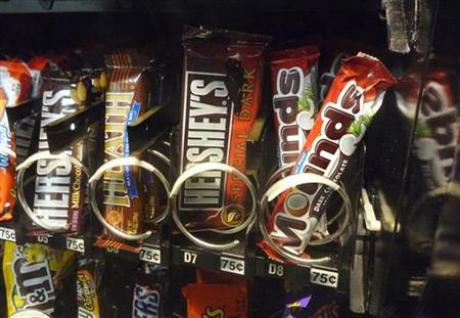
NEW YORK - A new study shows that candy, soda and other junk foods are commonly sold at stores not traditionally associated with food -- in a trend that researchers say may be contributing to the U.S. obesity problem.
The study, of more than 1,000 non-food retail stores across the U.S., found that 41 percent sold candy, soft drinks, chips and other sweet and salty snacks. The foods were most commonly placed at check-out counters, where they were "within arm's reach" of impulsive buyers, the researchers report in the American Journal of Public Health.
Nearly all drug stores and gas stations in the study sold snack foods -- as did a majority of general merchandise stores, hardware and garden stores and automobile repair shops.
Even some stores selling clothes, books or furniture offered customers a snack selection.
The problem, the researchers contend, is that this "ubiquity" of snack foods may tempt many people into buying calories that they otherwise would not.
And over time, those calories could add up to extra pounds, write Dr. Thomas A. Farley and colleagues at Tulane University School of Public Health in New Orleans.
A number of studies, the researchers note, have found that when people grab snacks throughout the day, they typically do not compensate by eating less at meals.
"This suggests that calories consumed through impulse purchases of snack foods will increase total daily (calorie) intake and thus contribute to weight gain," Farley and his colleagues write in their report.
They estimate that if a person sees snack foods at retail stores twice per week, and ends up buying a typical product only 10 percent of the time, that would mean an extra 2,600 calories in a year. That, in turn, could translate to close to a pound of weight gain per year.
For their study, the researchers evaluated 1,082 retail stores in 19 U.S. cities. They found that about 95 percent of drug stores and gas stations sold soft drinks and prepackaged snacks and sweets. The same was true of two-thirds of general merchandise stores.
In addition, a number of retailers not normally associated with food carried snack items, in some cases via vending machines or offered to customers for free. That included 39 percent of salons, 29 percent of rental businesses and bookstores, 22 percent of stores selling furniture and electronics, and 16 percent of clothing and accessory retailers.
The researchers note that traditional food establishments are required to have a permit to sell food. But that is not true of stores that sell only "prepackaged foods that are not potentially hazardous" -- that is, they do not present a risk of foodborne illness.
The researchers add, however, that the 100,000 annual deaths in the U.S. attributed to obesity far outnumber deaths from foodborne pathogens. "So it may be justified," they write, "to revisit the definition of potentially hazardous and to include (calorie)-dense snack foods."
taken from : China Daily



No comments:
Post a Comment